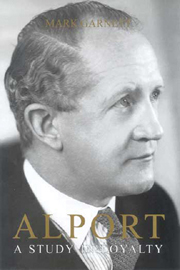Book contents
- Frontmatter
- Contents
- Acknowledgements
- Foreword
- Introduction
- 1 Father and Son
- 2 A National Faith
- 3 “Love and War”
- 4 Reviving Conservatism
- 5 “One Nation”
- 6 Early Postings
- 7 “Political Suicide”
- 8 “More Trouble with the Government, Daddy?”
- 9 A Freelance Diplomat
- 10 Gains and Losses
- Notes
- Bibliography
- Index
- Plate section
8 - “More Trouble with the Government, Daddy?”
- Frontmatter
- Contents
- Acknowledgements
- Foreword
- Introduction
- 1 Father and Son
- 2 A National Faith
- 3 “Love and War”
- 4 Reviving Conservatism
- 5 “One Nation”
- 6 Early Postings
- 7 “Political Suicide”
- 8 “More Trouble with the Government, Daddy?”
- 9 A Freelance Diplomat
- 10 Gains and Losses
- Notes
- Bibliography
- Index
- Plate section
Summary
In October 1961, six months into his “sudden assignment”, Cub had told Butler that “in this part of the world, there is still considerable panache in being the British representative”. He was enjoying the ceremonial aspects of his job, the gossip at cocktail parties and, above all, the sense that he was an important source of information for the government back home. Writing and receiving telegrams was a pleasure to him; letters were not such fun, because they were often out-of-date before they arrived. As High Commissioner he had faced acute political problems in his first few months but the excitement of living at the centre of a storm had compensated him for the regular frustrations. Having come through the double trouble of Katanga and Northern Rhodesia in September Cub must have felt equal to anything else that might be thrown at him.
Even so, “panache” was a curious word for Cub to choose. From the beginning he had sensed hostility from the European population of the Federation. In May 1961 a correspondent complained that he had felt “ill with revulsion” on hearing Cub deliver a speech which consisted of “Bloody sales-talk – and of a low order”. During Sandys' visit of the same month a federal politician attacked British ministers, “attributing to them every form of baseness of motive and method”; he rounded off his sally by telling Cub “with a deep and bitter emotion, ‘You know, I hate your government’”.
- Type
- Chapter
- Information
- AlportA Study in Loyalty, pp. 175 - 202Publisher: Acumen PublishingPrint publication year: 1999



